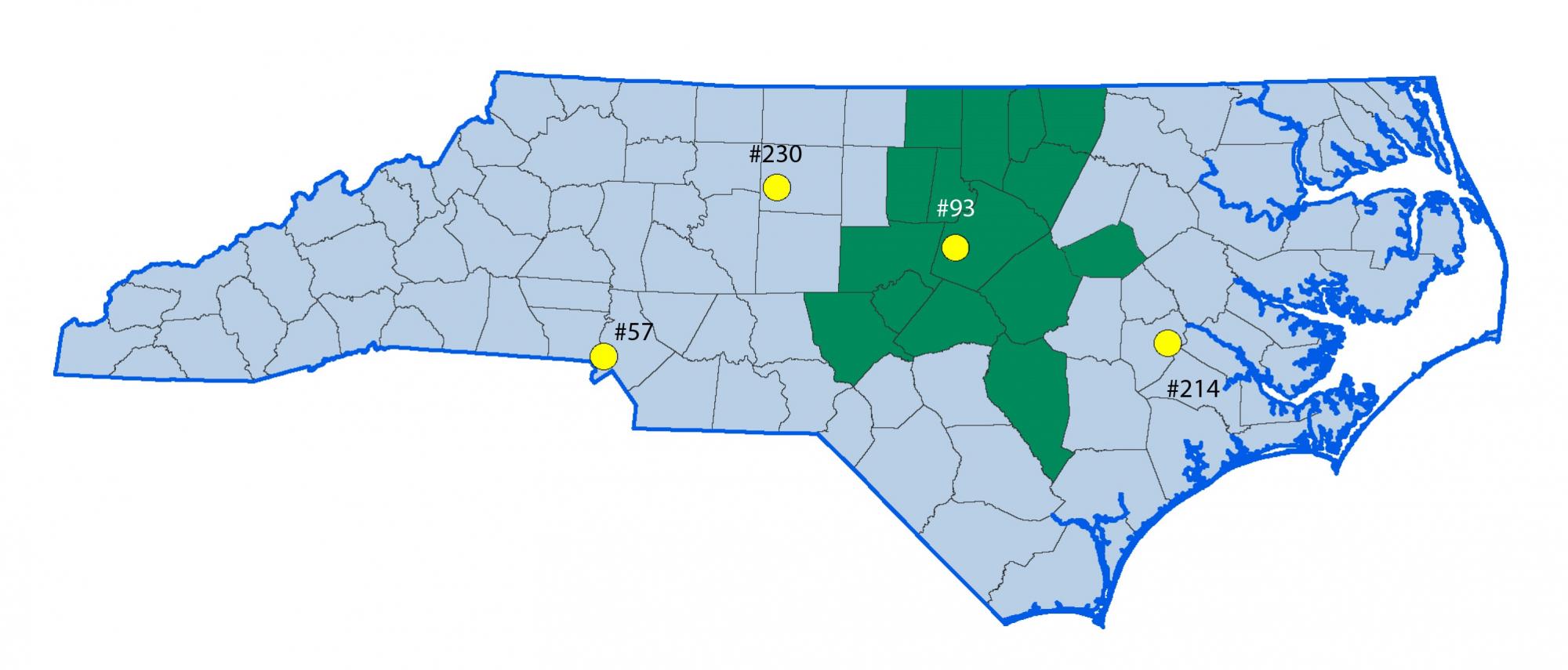CPRC is the grantee of the Research Triangle Area's full-service, multi-site Foreign Trade Zone #93 which allows companies importing and exporting products to reduce or delay custom duties or taxes on products received within the zone. The zone spans 15 counties, including Chatham, Durham, Franklin, Granville, Harnett, Johnston, Lee, Moore, Orange, Person, Sampson, Vance, Wake, Warren, and Wilson counties.
All businesses within the zone's boundaries are eligible to join the program. Businesses that conduct extensive importing or exporting of products may benefit extensively.

Current FTZ #93 Sites
Site 6 - GlaxoSmithKline (Wake County)
Site 8 - Tobacco Rag Processors, Inc. (Wilson County)
Site 11 - Liebel-Flarsheim Company, LLC (Wake County)
Site 12 - Storr Office Environments, Inc. (Wake County)
Site 14 - BrightView Technologies, Inc. (Durham County)
Subzone 93C - Merck Sharp and Dohme Corporation (Wilson County)
Subzone 93G - Revlon Consumer Products (Granville County)
Subzone 93H - Merck Sharp and Dohme Corporation (Durham County)
Subzone 93J - MAS ACME USA (Chatham County)
Foreign Trade Zone Benefits to Businesses
Duty Exemption: No duties or quota charges on re-exports (exception applies for exports to Canada and Mexico under NAFTA). By using a Foreign-Trade Zone, the company avoids the lengthy Customs duty drawback process. No duty is paid on goods destroyed in the zone, which can benefit a company with fragile imports or with manufacturing processes that result in large amounts of scrap.
Duty Deferral: Customs duties and federal excise tax deferred on imports until they leave the zone and enter the U.S. Customs territory. (Zone merchandise may move in-bond, Zone-to-Zone transfers without payment of duty.) Unlike bonded warehouses or temporary importing under bond programs, there is no limit on the length of time that merchandise may remain within the Zone, whether or not duty is owed.
Duty Reduction (Inverted Tariff): Where zone manufacturing results in a finished product that has a lower US Harmonized Tariff rate than the rates on foreign inputs, the finished product may be entered into the U.S. Customs territory at the duty rate that applies to its finished condition. Moreover, duty is not owed on labor, overhead or profit attributable to zone production operations.
Merchandise Processing Fee (MPF) Reduction: MPF is only paid on goods entering the U.S. Customs territory. Zone users are able to file a single entry for all goods shipped from a zone in a consecutive seven-day period instead of one entry file for each shipment (excluding merchandise subject to live entry). MPF fees are charged at 0.3464% of the Total Estimated Value (TEV) of the shipment, with a minimum fee of $27.23 and a maximum fee of $528.33 per entry. Fewer entry filings can also reduce Brokerage fees.
Streamlined Logistics: Upon approval from Customs, imports may be directly delivered to the zone. Users may also request permission to break and affix Customs seals. A single entry may be filed for seven consecutive days’ worth of entries and exports.
Quota Avoidance: In most instances, imports subject to quota may be retained within a Foreign-Trade Zone once a quota has been reached allowing zone users access to potentially discounted inputs and the ability to admit merchandise as soon as a new quota year starts. Additionally, except for certain textiles, inputs subject to quota may be manipulated or manufactured while in the zone into a product not subject to a quota.
How Much Can Your Company Save Through the FTZ?
Rates, Tariff, and Legal Review Board
The FTZ #93 Rates, Tariff, and Legal Review Board serves as an advisory committee to help oversee the operation, administration, and public utility nature of FTZ #93. Below is information about our current Board Officers:
OFFICERS
Chair: Vacant
Vice Chair: Rebecca Wyhof Salmon – Mayor of Sanford and Central Pines Regional Council delegate. Her current appointment is through December 2027.
MEMBERS
Jeri Barutis – Senior Manager International Trade with the Economic Development Partnership of North Carolina. Her current appointment is through October 2028.
Lori Bush – Town of Cary Council Member and alternate delegate to Central Pines Regional Council. Her current appointment is through December 2027.
Darryn Burich – Business Development Director with the Moore County Economic Development Partnership. His current appointment is through October 2028.
Tammie Hall-Robert – Assistant County Manager, Durham County. Her current appointment runs through December 2026.
Robert Handfield – Professor of Supply Chain Management, NC State University. His current appointment runs through December 2026.
Chris Johnson – Johnston County Economic Development Director. His current appointment is through December 2027.
Shirreef Loza – Director, U.S. Commercial Service – Raleigh. His current appointment runs through December 2026.
Jennifer Lantz – Wilson Economic Development Council Director. Her current appointment is through December 2025.
Mckinley Perkinson – Director, Henderson-Vance County Economic Development. Her current appointment runs through December 2026.
Angie Stewart – Harnett County Economic Developer. Her current appointment is through December 2027.
Sherry Wilborn – Person County Commissioner. Her current appointment is through October 2028.
Michael L. Weisel – Managing Member of Capital Law Group. His current appointment to the FTZ Board is through December 2025.